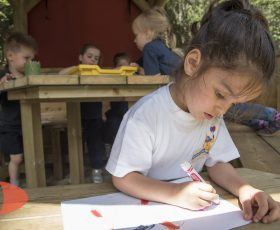At Clowns we take the safety of children very seriously and this includes computer and internet safety. We consider online safety a fundamental building block of digital literacy.
We are committed to making sure that the children are able to interact safely and with minimal risk when using technology within the nursery. At Clowns we monitor the devices, filter the content and use technology to transform teaching and learning in a safe way. Please see our Online Safety policy below:
At home the same kinds of monitoring and filtering can be achieved as those we employ at Clowns. However, the increase in mobile technology and apps is causing issues for a small number of children. Here is a selection of weblinks that we know have great information for parents, teachers and children:
Childnet
Hosts recommended resources for young people, parents, carers and teachers.
https://www.childnet.com/parents-and-carers
ThinkUKnow
Advice on internet safety for young people, parents and professionals
https://www.thinkuknow.co.uk/4_7/
NSPCC Online Safety Resources
Comprehensive information and advice for parents and carers including online safety resources, reviews of apps and conversation starters.
https://www.nspcc.org.uk/keeping-children-safe/online-safety/
UK Safer Internet Centre
The Parents and Carers’ section has information on parental controls for home internet, parental controls on devices and privacy settings on social networks.
https://saferinternet.org.uk/advice-centre/parents-and-carers
Internet Matters
Advice for parents of children of all ages – learn about it, talk about it, deal with it.
https://www.internetmatters.org/
CEOP
Police agency tackling child abuse on the internet. Website has a unique facility enabling parents and young people to make reports of actual/attempted abuse online.
https://www.ceop.police.uk/safety-centre/
The guides below are designed to support you in understanding and implementing online safety and your children’s interaction with the online world. We hope you can use them to help protect your child and consider just how appropriate these online experiences are for your family.


